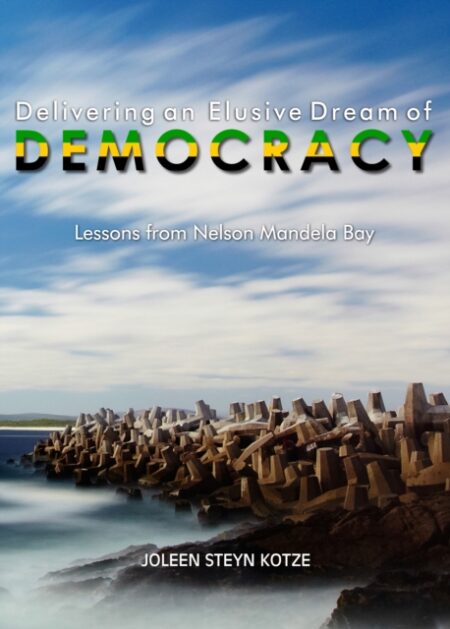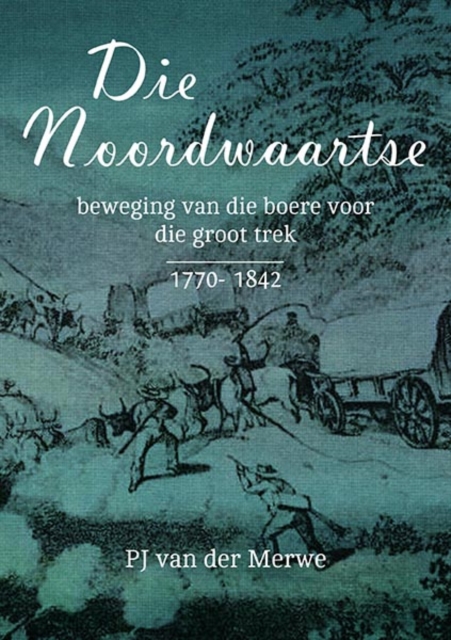-

Santa Claus
0R0,00The origins of Santa Claus, or so I am told, is that the young Bishop Nicholas secretly delivered three bags of gold as dowries for three young girls to their indebted father to save them from a life of prostitution. Armed with immortality, a factory of elves and a fleet of reindeer, his has been a lasting legacy, inextricably linked to Christmas.
Of course, this Christmas looks a little different. Amidst a global pandemic, shimmying down the chimneys of strangers certainly does not adhere to social distancing guidelines. Some borders remain closed, and in some instances, the quarantine period is far too long. After all, he only has 24 hours to spread cheer across the world. As with the rest of us, Santa Claus is likely to get the remote working treatment. The reindeers this year are likely to be self-driving, reminiscent of an Amazon swarm of technology, and the naughty and nice lists are likely to be based on algorithms derived from social media accounts. In the age of the fourth industrial revolution, it is difficult to imagine that letters suffice anymore. How many posts were verified as real before shared? Enough to get you a drone. Fake news? Here is a lump of coal. Will we see elves in personal protective equipment (PPE) and will Santa Claus, high risk because of age and his likely comorbidities from the copious amount of cookies, have to self-isolate in the North Pole? In fact, will there be any toys at all this year? Surely production has been stalled with the restrictions on imports and exports into the North Pole. Perhaps, there is a view to outsourcing, or perhaps, there is a shift towards local production and supply chains.
More importantly, as we have done in many instances in this period, maybe we should pause to reflect on the current structures in place. The sanctification of a figure so clearly dismissive of the Global South and to be critical, quite classist must be called into question. From some of the keenest minds, the contributions in this book make a strong case against this holly jolly man. We traverse important topics such as, is the constitution too lenient with a clear intruder who has conveniently branded himself a Good Samaritan? Allegations of child labour under the guise of elves, blatant animal cruelty, constant surveillance in stark contrast to many democratic ideals and his possible threat to national security come to the fore. Nevertheless, as the song goes, he is aware when you are asleep, and he knows when you are awake. Is feminism a farce to this beloved man what role does Mrs Claus play and why are there inherent gender norms in his toys? Then is the worry of closed borders and just how accurate his COVID-19 tests are.
Of course, this brings his ethics into question. While there is an agreement that transparency, justice and fairness, nonmaleficence, responsibility, and privacy are the core ethical principles, the meaning of these principles differs, particularly across countries and cultures. Why are we subject to Santa ClausO notions of good and evil when he is so far removed from our context? As Richard Thaler and Cass Sunstein would tell you, this is fundamentally a nudge from Santa Claus for children to fit into his ideals. A nudge, coined by Thaler, is a choice that predictably changes peopleOs behaviour without forbidding any options or substantially changing their economic incentives. Even with pinched cheeks and an air of holiday cheer, Santa Claus has to come under scrutiny. In the process of decolonising knowledge and looking at various epistemologies, does Santa still make the cut?
Print: View Print Version
-

Santa Claus
0R225,00The origins of Santa Claus, or so I am told, is that the young Bishop Nicholas secretly delivered three bags of gold as dowries for three young girls to their indebted father to save them from a life of prostitution. Armed with immortality, a factory of elves and a fleet of reindeer, his has been a lasting legacy, inextricably linked to Christmas.
Of course, this Christmas looks a little different. Amidst a global pandemic, shimmying down the chimneys of strangers certainly does not adhere to social distancing guidelines. Some borders remain closed, and in some instances, the quarantine period is far too long. After all, he only has 24 hours to spread cheer across the world. As with the rest of us, Santa Claus is likely to get the remote working treatment. The reindeers this year are likely to be self-driving, reminiscent of an Amazon swarm of technology, and the naughty and nice lists are likely to be based on algorithms derived from social media accounts. In the age of the fourth industrial revolution, it is difficult to imagine that letters suffice anymore. How many posts were verified as real before shared? Enough to get you a drone. Fake news? Here is a lump of coal. Will we see elves in personal protective equipment (PPE) and will Santa Claus, high risk because of age and his likely comorbidities from the copious amount of cookies, have to self-isolate in the North Pole? In fact, will there be any toys at all this year? Surely production has been stalled with the restrictions on imports and exports into the North Pole. Perhaps, there is a view to outsourcing, or perhaps, there is a shift towards local production and supply chains.
More importantly, as we have done in many instances in this period, maybe we should pause to reflect on the current structures in place. The sanctification of a figure so clearly dismissive of the Global South and to be critical, quite classist must be called into question. From some of the keenest minds, the contributions in this book make a strong case against this holly jolly man. We traverse important topics such as, is the constitution too lenient with a clear intruder who has conveniently branded himself a Good Samaritan? Allegations of child labour under the guise of elves, blatant animal cruelty, constant surveillance in stark contrast to many democratic ideals and his possible threat to national security come to the fore. Nevertheless, as the song goes, he is aware when you are asleep, and he knows when you are awake. Is feminism a farce to this beloved man what role does Mrs Claus play and why are there inherent gender norms in his toys? Then is the worry of closed borders and just how accurate his COVID-19 tests are.
Of course, this brings his ethics into question. While there is an agreement that transparency, justice and fairness, nonmaleficence, responsibility, and privacy are the core ethical principles, the meaning of these principles differs, particularly across countries and cultures. Why are we subject to Santa ClausO notions of good and evil when he is so far removed from our context? As Richard Thaler and Cass Sunstein would tell you, this is fundamentally a nudge from Santa Claus for children to fit into his ideals. A nudge, coined by Thaler, is a choice that predictably changes peopleOs behaviour without forbidding any options or substantially changing their economic incentives. Even with pinched cheeks and an air of holiday cheer, Santa Claus has to come under scrutiny. In the process of decolonising knowledge and looking at various epistemologies, does Santa still make the cut?
eBook: View eBook Version
-
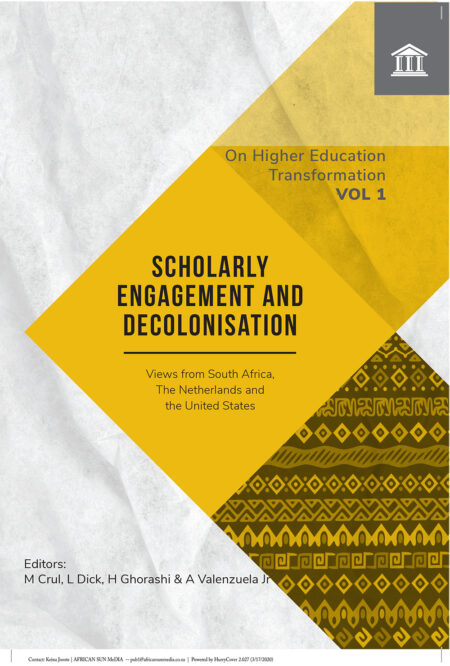
Scholarly Engagement and Decolonisation
0R350,00Considering that one of the core tasks of academia is to provide social critique and reflection, universities have an undeniable role to formulate the contours of a more inclusive academia in contrast to visible and normalised structures of exclusion. Translating such ambitions into transformative practices seems to be easier said than done. Academics need mutual inspiration and exchange of thoughts and practices to reflect on their actions and their own knowledge productions. The authors in this book mirror the challenges and achievements of academics and practitioners in three national contexts, which could serve as a foundation for academia to move towards dismantling elitist and privileged-based assumptions, and formulating new forms of knowledge production and institutional policies, inside and outside academia. The book aims to help create a more inclusive society in which academics, students and practitioners can engage, learn and transform structures of inequality, exclusion and disconnection where it seems to have the biggest impact.
-
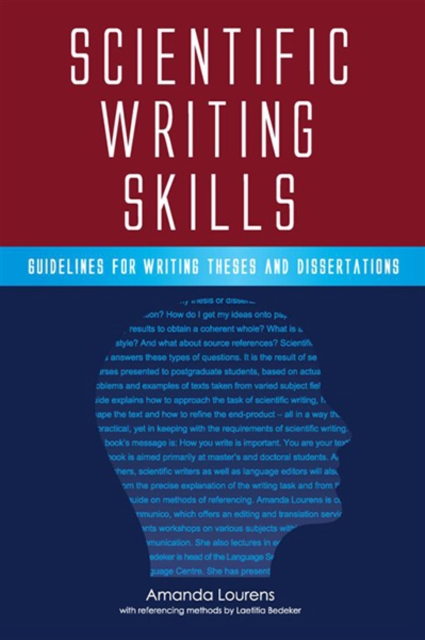
Scientific Writing Skills
0R265,00Where do I begin to write my thesis or dissertation? Which sections should such a text have? How do I get my thoughts onto paper? How do I combine all my results in one coherent whole? What is an academic writing style? How do I reference? Scientific Writing Skills gives answers to these questions. It is the result of many courses in scientific writing skills to postgraduate students based on real writing problems and text examples from diverse disciplines. It is a practical yet scientifically sound guide that helps the student tackle scientific writing. It is also available in Afrikaans as Wetenskaplike skryfvaardighede.
eBook: View eBook Version
-

Scientific Writing Skills
0R215,00Where do I begin to write my thesis or dissertation? Which sections should such a text have? How do I get my thoughts onto paper? How do I combine all my results in one coherent whole? What is an academic writing style? How do I reference? Scientific Writing Skills gives answers to these questions. It is the result of many courses in scientific writing skills to postgraduate students based on real writing problems and text examples from diverse disciplines. It is a practical yet scientifically sound guide that helps the student tackle scientific writing.It is also available in Afrikaans as Wetenskaplike skryfvaardighede.
Print: View Print Version
-

Scripture Frames and Framing
0R390,00Scripture Frames & Framing: A Workbook for Bible Translators illustrates and further develops some of the key ideas presented in the influential text Bible Translation: Frames of Reference (T. Wilt, ed., St Jerome, 2003). This workbook offers numerous exercises for analysing biblical texts and communicating them to contemporary audiences. The workbook proceeds by briefly introducing a key aspect of translation, giving exercises that will help clarify understanding of that aspect and of how it relates to translators? particular communication situations, and then moving on to a related aspect.
-
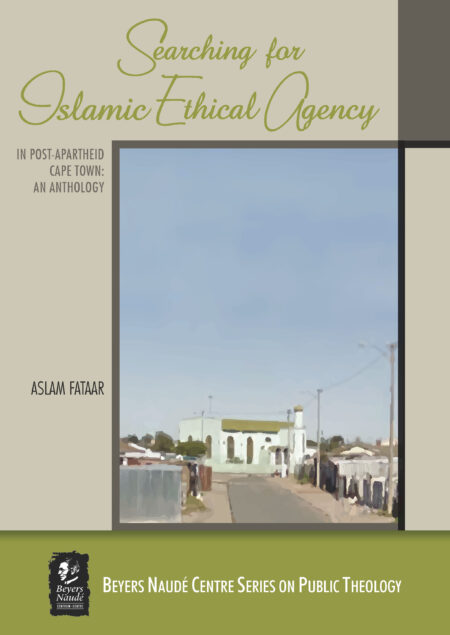
Searching for Islamic Ethical Agency in Post-Apartheid Cape Town
0R270,00EThe compositions brought together in this book began a quarter of a century ago in 1994, with the onset of South AfricaOs non-racial democracy, and in one way it may be viewed as the critical observations of an organic intellectualO engaging the exigencies of life during the first 25 years of South AfricaOs democracy.
The bookOs compositions are presented in chronological order, so the reader is able to follow the ebb and flow of life in post-apartheid South Africa. It is also fitting that the book commences with an excellent sermon about the Reconstruction and Development Programme (RDP) that was delivered at the Claremont Main Road Masjid (CMRM) in 1994, since the core of the compositions are sermons which were delivered here. These were all outstanding sermons, as those who witnessed their public performance can attest to. Their inclusion in this book thus provides a wonderful opportunity for a wider audience to benefit from Prof. FataarOs profound insights.
eBook: View eBook Version
-

Searching for Islamic Ethical Agency in Post-Apartheid Cape Town
0R220,00The compositions brought together in this book began a quarter of a century ago in 1994, with the onset of South AfricaOs non-racial democracy, and in one way it may be viewed as the critical observations of an organic intellectualO engaging the exigencies of life during the first 25 years of South AfricaOs democracy.
The bookOs compositions are presented in chronological order, so the reader is able to follow the ebb and flow of life in post-apartheid South Africa. It is also fitting that the book commences with an excellent sermon about the Reconstruction and Development Programme (RDP) that was delivered at the Claremont Main Road Masjid (CMRM) in 1994, since the core of the compositions are sermons which were delivered here. These were all outstanding sermons, as those who witnessed their public performance can attest to. Their inclusion in this book thus provides a wonderful opportunity for a wider audience to benefit from Prof. FataarOs profound insights.
Print: View Print Version
-
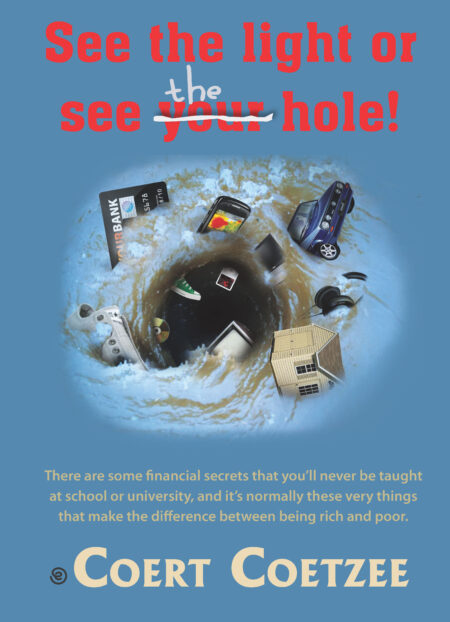
See the Light or See the Hole
0R140,00There are some financial secrets that youOll never be taught at school or university, and itOs normally these very things that make the difference between being rich and poor.
-

Select Essays on Governance and Accountability Issues in Public Law
0R240,00The essays in this book, authored by academics from the Faculties of Law at the University of Johannesburg and Nelson Mandela University respectively, emanate from a joint research project and conference arranged by the Faculties in 2018. The essays focus on public law issues impacting on governance and accountability in South African law and in international and regional law, but with a specific focus on problems afflicting the African continent.
eBook: View eBook Version
-

Select Essays on Governance and Accountability Issues in Public Law
0R195,00The essays in this book, authored by academics from the Faculties of Law at the University of Johannesburg and Nelson Mandela University respectively, emanate from a joint research project and conference arranged by the Faculties in 2018. The essays focus on public law issues impacting on governance and accountability in South African law and in international and regional law, but with a specific focus on problems afflicting the African continent.
Print: View Print Version


